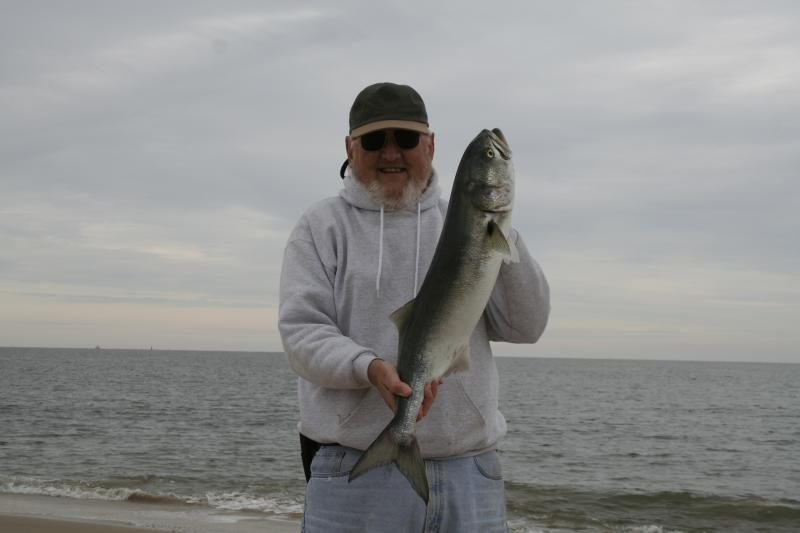Surf fishing on the beaches of Delaware
Over the past few weeks, I have received a few emails requesting information on local surf fishing. I will try to give folks an idea of what it takes as far as equipment and where to access the local beaches for the best chance of catching something in the surf.
As far as equipment, you do not need a 12-foot Hatteras Heaver to fish the Delaware surf. I use a 10-foot Tsunami Air Wave rod rated for 15- to 30-pound line and 2- to 4-ounce weights, and a Tsunami Rovex Silun 6000 reel with either 17-pound mono line or 20-pound braid. In either case, I use a 10-foot section of 30-pound fluorocarbon line as a shock leader. The shock leader is tied to the running line with an Albright or slim beauty knot. The terminal end of the shock leader is tied to a snap or snap swivel.
There are an infinite number of bottom rigs to chose from. I suggest ones made from monofilament with small hooks since the fish you are likely to catch are going to be small. The exceptions will be black drum in the spring and big bluefish, if they make a comeback. Red drum and cobia have been caught in recent years. Keep up with the local fishing reports, and if you hear those larger fish are in the area, you can change your rigs accordingly. Your local tackle shop will have bluefish rigs as well as rigs for black drum.
As far as bait, I use Gulp! and Fishbites almost exclusively. The only exception is when I am fishing for big blues, black drum, cobia and red drum. Then I will use cut bunker for the blues, live spot for the cobia, and sand fleas and crab for the drum.
Most of the time I will bait my top-bottom rigs with Fishbites bloodworms or sand fleas, and cast one out as far as I can and the other just beyond the breakers. I use tongue sinkers as they seem to hold better than any other.
I will put one rod in a sand spike, and the other I will hold and move in just a few cranks at a time. This way I can cover more bottom and find fish that may be holding in a certain location. This rig may have a bank sinker that is easier to move than the tongue sinker.
Most of what you will catch will be small. Spot, croaker, blues, kings (sea mullet, whiting) and the always-popular skates and dog sharks. Please release what you don’t want to eat, and don’t leave the skates and sharks on the beach to rot.
As far as surf casting, Tommy Farmer has a video that explains in pretty good detail how to cast a surf rod. It only costs $10, and if you are new to surf casting, it is a good investment.
If you want to catch a fish from the surf, especially during the summer, you are going to miss some sleep. You will want to be on the beach and set up at sunup. If you lounge around, eat a nice breakfast, talk to the guys at the tackle shop, stop by Starbucks for a big coffee and then go up on the beach, you will find lots of folks there to greet you. I find sunup to 10 a.m., then 4 p.m. until dark are the times to surf fish in the summer.
The hours between 10 a.m. and 4 p.m. are for the folks who aren’t exactly serious surf fishermen. They keep a line in the water to comply with the rule that they have to be actively surf fishing, but if they actually caught a fish, they would be shocked. I see nothing wrong with this. We did this when our kids were young. Fish early and late, go up and let the kids play during the middle of the day. Of course, there were nowhere near the number of vehicles on the beach as there are today.
For those who do not have a four-wheel-drive vehicle, getting to the beach can be tough. When I was in that situation, I carried my gear in a 5-gallon bucket and walked across the dunes. We parked along what is now Route 1.
If you can make the investment, there are surf carts that can carry everything you need, and today you only have to walk from the parking lot to the beach.
You may think what I am about to say is unnecessary, but when you arrive on the beach at sunup or late afternoon, you will be surprised and disgusted at the trash left by fellow fishermen. Just go ahead and pick it up and carry it out as those who left it should have done.






















































